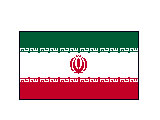|
|
TODAY.AZ / Politics
Iran makes more raw material for nuclear fuel
04 January 2007 [22:09] - TODAY.AZ

The U.N. Security Council voted unanimously on December 23 to impose sanctions on Iran's trade in sensitive nuclear materials and technology in an attempt to stop enrichment work that could produce the material for nuclear explosives.
"They (the West) should accept that this (nuclear work) is our national right and is irreversible," Gholamreza Aghazadeh, the head of Iran's Atomic Energy Organisation, was quoted as saying by the student news agency ISNA.
"This technology is Iranian-made and cannot be limited by sanctions."
Analysts say that to achieve its goal of "industrial-scale" enrichment with 54,000 centrifuge enrichment machines -- only around 350 are known to be operating experimentally so far -- Iran may still need to acquire equipment abroad.
Aghazadeh said Iran had now stockpiled 250 tonnes of uranium hexafluoride gas (UF6), the feedstock that is injected into centrifuges for enrichment into fuel.
"Today we have produced more than 250 tonnes of UF6, kept in tunnels that are almost unique in the world," he said.
The latest figures from the International Atomic Energy Agency (IAEA) say Iran had stockpiled a total of 165 tonnes of UF6 as of early November 2006.
Mark Fitzpatrick, nuclear non-proliferation analyst at London's International Institute for Strategic Studies, said 250 tonnes of UF6, if enriched to 90 percent or higher, would yield enough fuel for up to 50 nuclear warheads.
Iran has so far enriched token amounts of UF6 only to the 3-5 percent level required for power plant fuel. It says it has no intention of refining UF6 to the high level needed for bombs.
Aghazadeh repeated Iran's call for talks to resolve the dispute with the West, which believes Tehran wants to build nuclear warheads despite Iran's insistence that it wants to make fuel to generate electricity.
"We are ready to build confidence," he said.
In reaction to the U.N. resolution, Iran's parliament passed a bill last week obliging the government to revise its level of cooperation with the IAEA and to accelerate its nuclear work.
The bill gave President Mahmoud Ahmadinejad's government a free hand to decide whether it wanted to quit the nuclear Non-Proliferation Treaty (NPT) if pressured.
But Aghazadeh said Iran, the world's fourth largest oil exporter, had no intention of pulling out of the NPT. Reuters
URL: http://www.today.az/news/politics/34586.html
 Print version
Print version
Connect with us. Get latest news and updates.
See Also
- 03 December 2024 [15:24]
Azerbaijan discusses strengthening cooperation at 28th ECO Foreign Ministers' meeting - 03 December 2024 [14:22]
Azerbaijan elected as chair of UNCCD regional group and COP16 Bureau member - 03 December 2024 [13:32]
U.S. ambassador to Azerbaijan Mark Libby retires from U.S. diplomatic service - 03 December 2024 [13:00]
Stupidity versus cowardice: a new round of confrontation between Pashinyan and Aghazaryan - 03 December 2024 [11:05]
Turkiye appoints new ambassador to Azerbaijan - 03 December 2024 [10:45]
How the West betrayes and continues to betray Georgia and Ukraine - 03 December 2024 [09:38]
Azerbaijani Foreign Minister embarks on visit to Iran - 02 December 2024 [17:33]
CEC announces details of Azerbaijan's upcoming municipal elections - 02 December 2024 [15:00]
Armenian whining and the Azerbaijani magic wand - 02 December 2024 [14:26]
Western influence fuels tensions in post-election Georgia
Most Popular
 Secretary Blinken and Turkish FM Fidan discuss situation in Ukraine and S Caucasus
Secretary Blinken and Turkish FM Fidan discuss situation in Ukraine and S Caucasus
 "Armenian heritage" exists as long as it's funded – how CHW deceives the world.
"Armenian heritage" exists as long as it's funded – how CHW deceives the world.
 How the West betrayes and continues to betray Georgia and Ukraine
How the West betrayes and continues to betray Georgia and Ukraine
 Azerbaijan Defence Ministry presents weekly review
Azerbaijan Defence Ministry presents weekly review
 Armenian whining and the Azerbaijani magic wand
Armenian whining and the Azerbaijani magic wand
 Senegal demands truth for French colonial-era atrocities in West Africa
Senegal demands truth for French colonial-era atrocities in West Africa
 Milli Majlis hosts public hearing on return to Western Azerbaijan
Milli Majlis hosts public hearing on return to Western Azerbaijan
